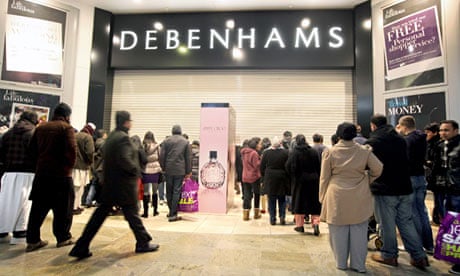Trading this Christmas was the toughest in almost 40 years, according to Debenhams' chief executive, Michael Sharp, as retailers battled to lure customers in to stores by slashing prices.
Debenhams ran sales for two extra days last year – cutting prices by 25% across the store and by 50% on some knitwear, lingerie and beauty lines – helping the department store chain to record December sales.
Like-for-like sales in the five weeks to 5 January jumped 5%, but at the cost of some profit. Sharp contradicted a claim by Next's boss, Simon Wolfson, this week that discounting had been lower this year, saying that was "factually incorrect".
"Next need to get out a bit more," he said. "I know that the high street was more promotional because I was out every day in all of my competitors' shops. It was quite plain the market was more promotional than last year." As a result, Debenhams halved its target for annual margin growth from 0.2% to 0.1%.
The company also announced and clarified some one-off costs, prompting analysts to hastily adjust their forecasts. Debenhams said the move to its new central London headquarters would cost £2m and the revamp of the flagship Oxford Street store might result in £2m to £3m of lost profits in the second half. The company added that growth in online sales would result in higher costs of warehousing and distribution.
Investors responded by selling shares, sending them down 6.5% before lunch, to 109p. Debenhams shares almost doubled during 2012, driven by strong online sales, so traders were quick to take profits.
Online sales continued to grow at the end of the year – up by almost 40% in the 18 weeks to 5 January – driving the group like-for-like sales 2.9% higher over the same period. Online sales now account for almost 13% of Debenhams' turnover. More customers are using mobile devices to access the website, accounting for 36% of traffic, but Sharp said customers browsing on a computer were more likely to end up buying products than those using mobile devices.
The group saw strong sales of party dresses and lingerie over the period. Many of its top-sellers were part of its Christmas advertising campaign, such as the Jonathan Saunders/Edition red coat, which sold out on the back of the advertisement.
Sharp said customers had become acclimatised to the new economic reality and were "extremely canny" about how they spent their money in the festive season. "They shop around and do their research before they decide where to buy." He expects that to continue into 2013.
"Customers will continue to search for value for money; they will continue to be very careful and cautious with where they spend their money," he said.
Debenhams plans to keep promotional activity this year at a similar level to 2012, but Sharp said that could change. "The reality of life is that we will react to market conditions as we see them at the time," he said.
Despite the challenging environment, with little growth in retail sales across the sector, he said he was confident Debenhams' momentum in like-for-like sales growth would continue this year.
"The market isn't growing, it's about stealing market share if we're going to grow. I'm optimistic."

Comments (…)
Sign in or create your Guardian account to join the discussion